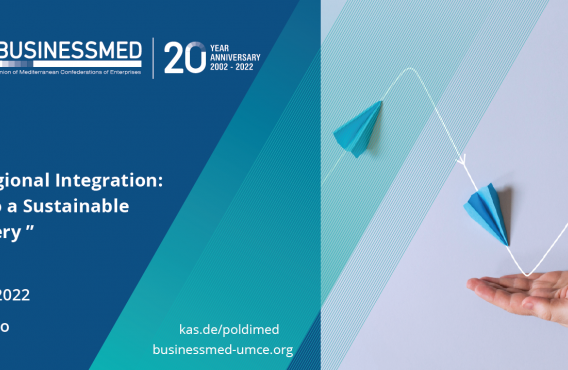Joint Event KAS-BUSINESSMED "South-South Regional Integration: A way forward to a sustainable economic recovery post-Covid19"
-
Date16 March 2022
Joint Event KAS-BUSINESSMED "South-South Regional Integration: A way forward to a sustainable economic recovery post-Covid19"
Ever since its outbreak early in 2020, the Covid-19 pandemic continues to challenge and disrupt economies around the world. The impact is particularly salient for Africa, which saw decades’ worth of economic and social progress erased almost overnight (the International Finance Corporation, 2022).
The sanitary crisis exposed and exacerbated preexisting bottlenecks and endemic challenges. Rampant unemployment, unsustainable debt, governance woes, increased extreme poverty (more than 40 million additional people) and climate change are enduring structural challenges that predate the pandemic in Sub-Saharan Africa.
Economies based on extractive resources, notably the continent’s two leading economies (Nigeria and South Africa), were the most hardly hit by the crisis in 2020 due to the drop in energy demand. Likewise, countries that rely on tourism, which was sharply affected by border closings in 2020 and the halt of international flights, are still being penalized today by the health restrictions that continue to be applied in many areas around the world.
Despite its negative record, the pandemic will not deter Sub-Saharan Africa’s long-run growth path, expected to grow up to 3.8% in 2022, according to the International Monetary Fund (June 2021). This rebound is currently fueled by elevated commodity prices, a relaxation of stringent pandemic measures, and recovery in global trade, but remains vulnerable given the low rates of vaccination on the continent, protracted economic damage, and a slow pace of recovery (World Bank 2021).
The MENA region is not immune either from the pandemic that caught the global economy off guard. The situation in North Africa is rather mixed, as the petroleum exporting nations (Algerian and Libya) suffered from a strong recession last year but can hope to rebound substantially. Morocco and Tunisia will also enjoy a rebound (growth around 4%), despite the ongoing recessionary effects of the tourism sector in 2021.
The recovery is taking shape both in sub-Saharan Africa and North Africa, due to the mitigation of Covid-19 restrictions coupled with the vaccine rollout, although it runs the risk of being uneven (a two-speed recovery). Hence, it is critically important to conceive regional integration and cooperation arrangements as part and parcel of an enabling environment for a more resilient, inclusive and sustainable future.” UNCTAD, 2021.
Main objectives of the Workshop
As part of the efforts undertaken to connect rescue (emergency-oriented measures) to a sustainable economic recovery in the region, the Regional Programme Political Dialogue South Mediterranean of the Konrad Adenauer Stiftung (KAS PolDiMed) and the Union of the Mediterranean Confederations of Enterprises (BUSINESSMED) joined forces by hosting a regional conference that intends to:
- Examine South-South Economic integration’s background from legal, academic, professional and governmental perspectives
- Provide an overview on the state of art, challenges and lessons learnt of the existing economic cooperation mechanisms
- Highlight perspectives on south-south cooperation post Covid-19
- Share testimonials/ success stories (e.g. successful entrepreneurs who own southern businesses)










